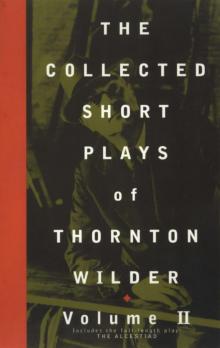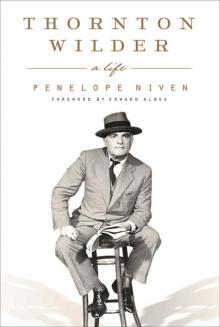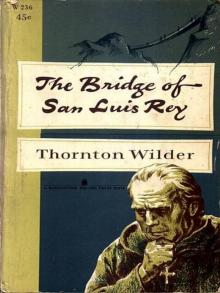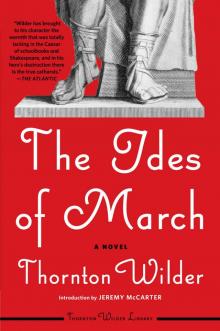- Home
- Thornton Wilder
Theophilus North Page 10
Theophilus North Read online
Page 10
“Wait until you see what I do with that!—Great Heavens! It’s a quarter of one—my guests will be arriving for lunch. Give me those notes. I’m going to start working on them at once.”
Whatever one might think of Flora Deland, she was a diligent hard-working woman. Bees and ants could have taken lessons from her. My reading sessions with Miss Wyckoff were interrupted for two weeks during which she paid a visit to some old friends at their rustic camp on Squam Lake in New Hampshire. When she returned she invited me to tea at once. I made it a rule to accept no social invitations, but no rule could stand in the way of what I wished to learn about the progress of my PLAN.
Miss Wyckoff received me in a state of considerable agitation.
“Mr. North, the most extraordinary thing has happened. I’m at my wit’s end. A newspaper woman has been publishing a series of articles about this house! Look at the piles of letters I’ve been getting! Architects want to visit the house and bring their students. Musicians want to see the house. People from all over the country want appointments when they may see the house. Droves of strangers are ringing the doorbell all day. . . .”
“What have you done about it, Miss Wyckoff?”
“I haven’t answered a single letter. Mrs. Delafield had orders not to admit strangers. What do you think I should do?”
“Have you read that newspaper woman’s articles?”
“Dozens of people have sent them to me.”
“Did they make you very angry?”
“I don’t know where she got all that information. There’s nothing horrid in them; but there are hundreds of things about this house that I never knew before and . . . this is my home. I spent a large part of my life here. I don’t know if they’re true or not.”
“Miss Wyckoff, I confess I read the articles and I was very surprised. But you can’t deny that it’s a very beautiful house. Fame is one of the consequences of excellence, Miss Wyckoff. The possession of a thing of exceptional beauty carries certain responsibilities. Have you ever visited Mount Vernon?”
“Yes. Mrs. Tucker asked us to tea.”
“Did you know that certain portions of the house were open to the public on certain hours of the week? I suggest that you engage a secretary to handle this matter. Have an entrance card engraved and let the secretary send it to all those who seem to be seriously interested, stating the hours at which they may view the Wyckoff House.”
“It frightens me, Mr. North. I wouldn’t know how to answer the questions they might ask.”
“Oh, you won’t be there. Your secretary will show them about and answer their questions only in a very superficial way.”
“Thank you. Thank you. I guess that’s what I must do. But, Mr. North, there’s something far more serious.” She lowered her voice: “People want to bring the sick here. . . . Whole companies from religious schools want to come and pray here! I never heard of this Sister Colomba. My dear brother I told you about was a very sickly child and I think I remember that we did have some nurses from the religious orders; but I don’t remember one of them.”
“Miss Wyckoff, there’s an old Greek saying, ‘Reject not the gifts of the gods.’ You said that a ‘malediction’ hung over this house. It appears to me that that malediction is lifting. . . . I can tell you that all Newport is talking about the beauty and healthfulness of this house, and about the blessing that dwells here.”
“Oh, Mr. North, I’m frightened. I’ve done a wicked thing. Even my old friends who’ve come to tea with me for years now want to see the room where Sister Colomba died. What could I do? I told a lie. I chose a room near my poor brother’s where a night nurse probably slept.”
“You foresee the next step, don’t you, Miss Wyckoff?”
“Oh, dear! Oh, dear! What’s the next step?”
“Servants will be clamoring to live in this house.”
She put her hand over her mouth and stared at me. “I never thought of that!”
I leaned forward and said in a low but very distinct voice: “Miss Wyckoff requests the pleasure of your company for dinner on such-and-such a day. At the conclusion of dinner the Kneisel Quartet with an assisting guest violist will perform the last two string quintets of Wolfgang Amadeus Mozart.”
She stared at me. She rose and clasped her hands, saying, “My childhood! My beautiful childhood!”
“Nine Gables”
One of my first summonses to be interviewed came in the form of a note from Sarah Bosworth (Mrs. McHenry Bosworth), “Nine Gables,” such and such a number, Bellevue Avenue. The writer’s father, Dr. James McHenry Bosworth, it said, had employed many readers, a number of whom had proved to be unsatisfactory. Could Mr. North present himself at the above address at eleven o’clock on Friday morning to be interviewed by Mrs. Bosworth on this matter? Kindly confirm the appointment by telephone, et cetera, et cetera! I telephoned my compliance and promptly visited the “People’s Library” (as it was then called) to consult various reference books about this family.
The Honorable Dr. James McHenry Bosworth was seventy-four years old, a widower, father of six and grandfather of many. He had served his country as attaché, first secretary, minister, and ambassador to several countries on three continents. In addition he had published books on early American architecture, notably Newport’s. Further inquiry revealed that he lived the year round in Newport and that several of his children maintained summer homes in the vicinity—in Portsmouth and Jamestown. Mrs. McHenry Bosworth was his daughter, divorced and childless, who had resumed her maiden name under this form.
On that Friday morning in late April—the first radiantly springlike day of the year—I drove my bicycle to the door and rang the bell. The house was neither a French château nor a Greek temple nor a Norman fortress but a long rambling cottage, under weather-silvered shingles, adorned with wide verandahs, turrets, and gables. It stood in extensive grounds ennobled by mighty and far-sought trees. Within the house there was nothing rustic whatever. Through the open but latched screen door I saw a platoon of men servants in striped waistcoats and maids in uniform with flying white sashes waxing the floors and polishing the furniture. I was to learn later that the furniture well rewarded this care; here was the largest collection outside a museum of Newport’s notable eighteenth-century cabinetmakers.
A formidable butler in a red striped vest and a green apron appeared at the door. I announced my business. His eyes rested with a kind of outrage on my bicycle. “Err . . . You are Mr. North?” I waited. “In general, sir, this door is not used in the morning. You will find the garden door around the corner of the house at your left.”
I was willing to enter the house by the chimney or the coal cellar, but I didn’t like the butler, his protruding eyes, his superfluous chins, and his tone of contempt. It was a beautiful morning. I felt fine. I didn’t need the job as badly as that. I brushed my sleeve slowly and took my time. “Mrs. Bosworth asked me to call at this address at this hour.”
“This door is not generally used . . .”
I had learned from my youth up—and in the Army—that when you are confronted with self-important authority and browbeating the procedure is as follows: smile amiably, even deferentially, lower your voice, affect a partial deafness, and talk steadily, dragging in red herrings and bushy-tailed squirrels. The result is that Sir Pompous raises his voice, becomes distraught, and (above all) attracts others to the scene.
“Thank you, Mr. Gammage . . . Mr. Kammage. I assume that you are expecting the piano-tuner, or—”
“What?”
“Or the chiropodist. What a lovely day, Mr. Gammage! Kindly tell Mrs. Bosworth that I have called as she requested.”
“My name is not . . . Sir, take your bicycle to the door I have indicated.”
“Good morning. I shall write Mrs. Bosworth that I called. Irasci celerem tamen ut placabilis essem.”
“Sir, are you deaf or insane?”
“Dr. Bosworth—I knew him well in Singapore—Raffles Hotel, you know. We us
ed to play fan-tan.” I lowered my voice still further—”Temple bells and all that. Punkahs swaying from the ceiling—”
“I’ve . . . I’ve . . . ‘ad enough of you. Go away!”
It always works. Indeed, others had been drawn to the scene. The platoon of servants gazed open-mouthed. A handsome woman of middle age appeared in the distance. A young woman in a pale green linen dress (Persis, Persis herself!) had descended the great staircase. I came to think of “Nine Gables” as the house of hidden listening ears.
The lady in the distance called, “Willis, I am expecting Mr. North. . . . Persis, this is none of your affair. . . . Mr. North, will you follow me into my sitting room?”
The divine Persis glided between Mr. Willis and myself, lifted the latch without glancing to right or left, and disappeared. I thanked Mr. Willis (who had lost the power of speech) and advanced slowly down the long hall. Through an open door I saw in one of the sitting rooms a large painting, “The Three Bosworth Sisters,” perhaps by John Singer Sargent—three lovely girls, seated nonchalantly on a sofa, endowed with everything, including angelic dispositions. It was painted in 1899. Those sisters were Sarah, who had been briefly married to the Honorable Algernon De Bailly-Lewyss and was now Mrs. McHenry Bosworth; Mary, Mrs. Cassius Marcellus Leffingwell; and Theodora, Mrs. Terence On-slowe, long resident in Italy. Mrs. Bosworth, the eldest of the three, was in a rage also. “I am Mrs. Bosworth. Will you sit down, please.”
Gazing about I admired both the room and the lady. I noticed that a door at my left was ajar; every other door in sight was wide open. I suspected that the eminent Dr. Bosworth was probably overhearing this interview. Mrs. Bosworth had arranged three books beside her, each with a colorful book-marker between the pages. I suspected that one marked the page selected to eliminate the applicant.
“My father’s eyes are easily tired. For one reason or another his readers have proved unsatisfactory. I know his tastes. In order to save your time, might I ask you to commence reading at the top of this page?”
“Certainly, Mrs. Bosworth.”
I kept her waiting. Well, well! It was the history by my old friend Mr. Gibbon. Things were going badly in the eastern Mediterranean, a mess of court intrigues, dozens of Byzantine names, jaw-breakers of all kinds; but bloodwarming. I read slowly and enjoyed myself.
“Thank you,” she finally said, interrupting me in an assassination. She rose and apparently without design closed the door beside me. “Your reading has much to recommend it. I am sorry to have to tell you that my father finds a reading with intermittent emphasis very tiring. I don’t think I should waste your time any longer.”
From behind the closed door an old man’s voice could be heard calling, “Sarah! Sarah!” She put out her hand to me and said, “Thank you, Mr. North. Good morning!”
“Sarah! Sarah!” In the next room a handbell rang; a hurled object smote the door. It opened revealing a trained nurse. I looked about the floor as though I had lost something. Willis appeared. Persis appeared.
“Willis, go about your work. Persis, this is none of your affair!”
Whereupon the old man himself appeared. He was wearing a quilted dressing-gown; his pince-nez danced on his nose; his Vandyke beard pointed toward the horizon.
“Send that young man in to me, Sarah. Finally we have found someone who can read. The only readers you’ve ever found are retired librarians with mice in their throats, God help us!”
“Father, I will send Mr. North in to you directly. You go back to your desk at once. You’re an ill man. You mustn’t get excited. Nurse, take my father’s arm.”
For the second time I had introduced discord into “Nine Gables.” I must change my ways. When the bystanders had withdrawn, Mrs. Bosworth resumed her seat and asked me to sit down. How she hated me!
“In the event that Dr. Bosworth approves of you as a reader there are some things you should know. My father is an old man; he is seventy-four. He is not a well man. His health has caused us great concern. In addition, he has a number of idiosyncrasies to which you must pay no attention. He tends to make large promises and to enter into extravagant projects. Any interest in them on your part could only lead you into serious difficulties.”
“Sarah! Sarah!”
She rose. “I want you to remember what I have said. Have you heard me?”
I looked her in the eye and said amiably, “Thank you, Mrs. Bosworth.”
That was not the answer she expected nor the tone to which she was accustomed. She replied sharply, “Any further trouble from you and you go out of this house at once.” She opened the door. “Father, this is Mr. North.”
Dr. Bosworth was sitting in a heavily cushioned chair before a great table. “Please sit down, Mr. North. I am Dr. Bosworth. You may have heard my name. I have been able to be of some service to my country.”
“Indeed, I know of your distinguished career, Dr. Bosworth.”
“Hm . . . very good . . . May I ask where you were born?”
“In Madison, Wisconsin, sir.”
“What was your father’s occupation?”
“He owned and edited a newspaper.”
“Indeed! Did your father also attend a university?”
“He graduated from Yale and obtained a doctorate there.”
“Did he? . . . Vous parlez français, monsieur?”
“J’ai passé une année en France.”
There followed: what occupation had I been engaged in since leaving school? . . . my age? . . . my marital status? . . . what plans I entertained for later life, et cetera, et cetera.
I rose. “Dr. Bosworth, I came to this house to apply for a position as a reader. I was told that you have had many unsatisfactory readers. I foresee that I shall disappoint you also. Good morning.”
“What? What?”
“Good morning, sir.”
He appeared to be highly astonished. I left the room. As I progressed down the great hall, he called after me: “Mr. North! Mr. North! Kindly let me explain myself.” I returned to the door of his study. “Please sit down, sir. I did not intend to be intrusive. I ask your apology. I have not left this house for seven years except to visit the hospital. We who are shut in tend to develop an excessive curiosity about those who attend us. Will you accept my apology?”
“Yes, sir. Thank you.”
“Thank you . . . Are you free to read to me this morning until twelve-thirty?”
I was. He placed before me an early work of George Berkeley. When a variety of bells struck the half hour before one I finished a paragraph and rose. He said, “We have been reading from a first edition of this work. You may be interested in seeing the inscription on the title page.” I reopened the book and saw that it had been inscribed by the author to his esteemed friend Dean Jonathan Swift. It took me some time to recover from my astonishment and veneration. Dr. Bosworth asked me if I had heard of Bishop Berkeley previously. I told him that at Yale University I had roomed in Berkeley Hall, that all Yale men were proud that the philosopher had left a part of his library to enrich our own—the books had been transported by bullock cart from Rhode Island to Connecticut; that moreover I had spent much of my boyhood in Berkeley, California, where we were often reminded that the town was named after the Bishop. We were pronouncing the name differently but had no doubt that it was the same man.
“God bless my soul!” exclaimed Dr. Bosworth. It is difficult for a Harvard man to believe that sober scholarly interests are pursued elsewhere.
It was arranged that I was to read for two hours on four days of the week. George Berkeley is not easy reading and neither of us had been trained in rigorous philosophical discussion, but we allowed no paragraph to be left behind without thorough digestion.
Two days later he interrupted our reading to whisper to me conspiratorially; he rose and opened the door to the great hall abruptly and peered about as though to surprise eavesdroppers; he repeated this manoeuvre at the door leading into his bedroom. Then he returned to his table and, lower
ing his voice, asked me, “You know that Bishop Berkeley lived three years in Newport?” I nodded. “I am planning to buy his house ‘Whitehall’ and fifty surrounding acres. There are many difficulties about it. It is still a great secret. I plan to build an Academy of Philosophers here. I was hoping that you would help me draft the invitations to the leading philosophers in the world.”
“To come and lecture here, Dr. Bosworth?”
“Sh! . . . Sh! . . . No, to come and live here. Each would have his own house. Alfred North Whitehead and Bertrand Russell. Bergson. Benedetto Croce, and Gentile. Wittgenstein—do you know if he is still alive?”
“I am not sure, sir.”
“Unamuno and Ortega y Gasset. You must help me draft the letters. The Masters are to have full liberty. They may teach or not teach, lecture or not lecture. They would not even be required to meet one another. Newport would become like a great lighthouse on a hill—a Pharos of Mind, of elevated thought. There is so much planning to be done! Time! Time! They tell me I am not well.”
He heard—or thought he heard—a step outside the door. He put his forefinger against his mouth warningly, and we returned to our reading. The subject of the Academy did not arise again for some time. He seemed to fear that we were surrounded by too many spies.
At the end of the second week he asked if I was averse to late hours; he enjoyed a long siesta in the afternoon and felt no need to retire before midnight. This suited me very well as there were increasing requests for my time in the morning. The Bosworths gave several dinner parties a week, but it was the host’s custom to rise from the table at ten-thirty—having partaken of some invalid’s diet—and to join me in the library. As the season advanced these occasions became more frequent and more elaborate. It was a childish vanity on the part of the former diplomat to commemorate at these meals the national holidays of the countries where he had served; he was thus enabled to wear the decorations that had been conferred upon him. Neither our Independence Day nor the Fall of the Bastille happened to coincide with my visits to the house, but often enough he arrived resplendent in the study, murmuring modestly that “Poland had had a tragic but gallant history” or that “one could not overestimate the contributions of Garibaldi,” or of Bolivar or of Gustavus Adolphus.

 The Collected Short Plays of Thornton Wilder, Volume II
The Collected Short Plays of Thornton Wilder, Volume II Penelope Niven
Penelope Niven The Selected Letters of Thornton Wilder
The Selected Letters of Thornton Wilder The Bridge of San Luis Rey
The Bridge of San Luis Rey Theophilus North
Theophilus North The Woman of Andros / the Ides of March
The Woman of Andros / the Ides of March The Eighth Day
The Eighth Day The Ides of March
The Ides of March The Skin of Our Teeth
The Skin of Our Teeth The Woman of Andros and The Ides of March
The Woman of Andros and The Ides of March